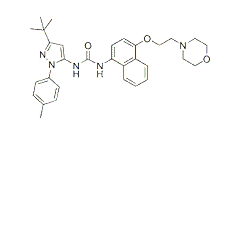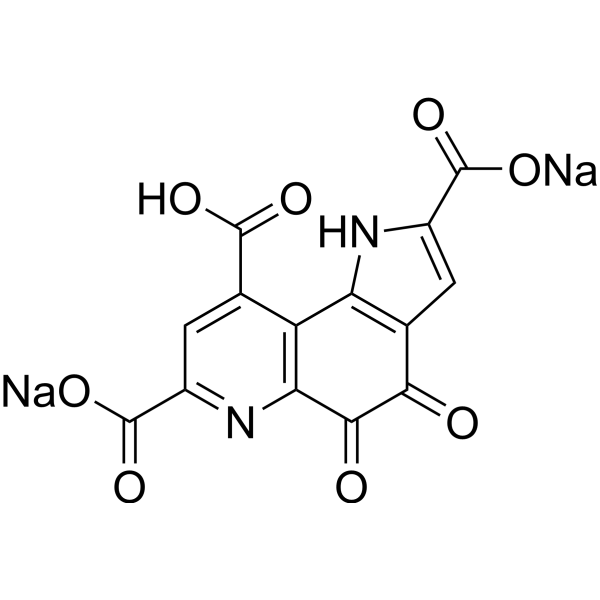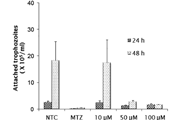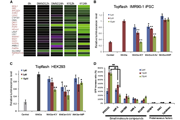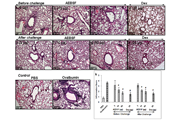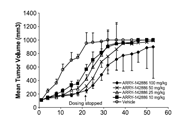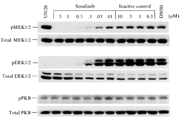-
生物活性
Doramapimod is a highly selective p38α MAPK inhibitor to TNF-α with EC50 of 18 nM. At 10 μM, doramapimod inhibits JNK2 in vitro, but at the low concentration necessary to inhibit p38α, it does not affect the phosphorylation of JNK substrates in cells. Doramapimod is an inhibitor of Raf-1. Inhibits LPS-induced TNFα production in human PBMCs and whole blood (IC50 values are 21 and 960 nM, respectively). Also inhibits JNK2α2 and c-Raf-1 (IC50 values are 98 nM and 1.4 μM, respectively). Cell permeable.
Kinase inhibition of Doramapimod

Time-dependentinhibition of all four p38 MAPK isoforms by Doramapimod

Theapparent IC50 for inhibition of the phosphorylation after preincubation[3]
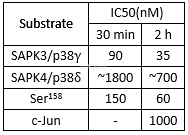
Doramapimod inhibited TNF-α production in THP.1 cells at an IC50 of 18 nM, as well asin human whole blood at an IC50 of 780 nM.[4]
-
体外研究
-
体内研究
30% PEG400+0.5% Tween80+5% propylene glycol
-
激酶实验
p38αEnzymatic assay[1]
7.5ng recombinant human full lengthN-terminal GST-tagged p38αwas preincubated at room temperature for 1h with 1μL inhibitor and 4μL assay dilution buffer. The kinase assay was initiated when 5μLof a solution containing 200ng recombinant human full length, N-terminalHis-tagged MAPKAP-K2, 200μM ATP (0.8μCi hot ATP), and 30mM MgCl2 in assay dilution buffer was added. Thekinase reaction was allowed to continue at room temperature for 25 min and wasthen quenched with 5μL 5X protein denaturing buffer (LDS) solution. Protein was furtherdenatured by heating for 5 min at 70oC. 10μL of eachreaction was loaded into a 15 well, 4–12% precast NuPage gel and run at 200 V andupon completion, the front which contained excess hot ATP was cut from the geland discarded. The gel was then dried and developed onto a phosphor screenwhich was scanned on a Storm 820 scanner and quantitated from opticaldensitometry using image quant v5.0. A negative control which contained noactive enzyme was used as a negative control and a reaction without inhibitor wasused as the positive control. Final compound concentrations were 100μM,31.6μM, 10μM, 3.16μM, 1μM, 316 nM, 100 nM, 31.6 nM, 10 nM, 3.16 nM, 1 nM, 316 pM, and 100pM.
-
细胞实验
Materials[5]
Doramapimod (BIRB796) was diluted with DMSOto make 10 mM DMSO stock solution that was diluted with PBS before celltreatment. Therefore, 0.03% of DMSO was used as a vehicle control in allexperiments. Mouse soluble macrophagecolony-stimulating factor (MCSF) and recombinant mouse or human RANKL werediluted with sterile phosphate buffered saline (PBS) containing 0.1% bovineserum albumin (BSA) according to the manufacturer's protocol. Stock dilution wascarried out by PBS.
Isolationand differentiation of mouse BMMs into osteoclasts
After cervical dislocation, bone marrowcells (BMCs) were obtained from 5-week old male ICR mice by flushing femurs andtibias with a-MEM supplemented with antibiotics (100 units/ml penicillin and100 mg/ml streptomycin). BMCs were cultured on a culture dish in a-MEMsupplemented with 10% FBS with 10 ng/ml of M-CSF for 1 day. Then, afternon-adherent BMCs were replated on a Petri dish and cultured for 3 days in thepresence of M-CSF (30 ng/ml), adherent BMMs were used for osteoclastdifferentiation. Then, BMMs (1 x 104cells/well in a 96-well plateor 3x 105cells/well in a 6-well plate) were seeded in triplicateand cultured in the presence of M-CSF (30 ng/ml) and mRANKL (10 ng/ml) for 2 or4 days in order to generate pre-osteoclasts or TRAPþ-MNCs.
Boneresorption assay
BMMs (1 x 104cells) were seededand cultured for 2 days to differentiate into pre-osteoclasts in the presenceof M-CSF (30 ng/ ml) and RANKL (10 ng/ml) on BioCoat Osteologic MultiTestslides. Then, cells were treated with doramapimod for 1 day. For measuring thearea of resorbed pits, cells were removed using 5% sodium hypochlorite for 5min, and then, after the plate was washed with PBS, the total resorption pitswere photographed under a light microscope and analyzed using NIH ImageJ 1.43usoftware.

-
动物实验
Animalsand Treatment in Vivo[6]
Six-week-oldmale Crlj:CD1(ICR) mice wereacclimated to our laboratory for 10 days prior to treatment. Twelve animalswere randomly assigned to a control group and three treatment groups based onbody weight. The mice were housed in individual cages under controlled lighting(12 h light/12 h dark cycle) and given pelleted food (CRF-1) and municipal drinkingwater ad libitum. They were then fasted for approximately 16 h prior toreceiving BIRB-796 administered orally at a dose of 250, 500 or 1000 mg /kg.Animals in the control group were administered the vehicle, a 0.5% (w/v)methylcellulose aqueous solution, in the same manner. An approximately 24hlater, the mice, anesthetized with pentobarbital sodium, were bled from the postcava.After blood samples were collected, the mice were exsanguinated immediately toobtain their livers. The livers were preserved in RNAlater at −30°C.
Assessmentof Blood Chemistry
The blood samples were centrifuged at 1870g for 15 min at 4°C. The resulting plasma was immediately stored atapproximately –80°C in an ultra-deep freezer until measurements were made. Plasmalevels of aspartate aminotransferase (AST), alanine aminotransferase (ALT),total bilirubin (TBil) and direct bilirubin (DBil) were determined using a 7070analyzer. The Shirley–Williams test was performed using a non-clinical package.

-
不同实验动物依据体表面积的等效剂量转换表(数据来源于FDA指南)
|  动物 A (mg/kg) = 动物 B (mg/kg)×动物 B的Km系数/动物 A的Km系数 |
|
例如,已知某工具药用于小鼠的剂量为88 mg/kg , 则用于大鼠的剂量换算方法:将88 mg/kg 乘以小鼠的Km系数(3),再除以大鼠的Km系数(6),得到该药物用于大鼠的等效剂量44 mg/kg。
-
参考文献
[1] Dietrich J, Hulme C, Hurley LH. The design, synthesis, and evaluation of 8 hybrid DFG-out allosteric kinase inhibitors: a structural analysis of the binding interactions of Gleevec, Nexavar, and BIRB-796. Bioorg Med Chem. 2010;18(15):5738-5748.
[2] Pargellis C, Tong L, Churchill L, et al. Inhibition of p38 MAP kinase by utilizing a novel allosteric binding site. Nat Struct Biol. 2002;9(4):268-272.
[3] Kuma Y, Sabio G, Bain J, Shpiro N, Marquez R, Cuenda A. BIRB796 inhibits all p38 MAPK isoforms in vitro and in vivo. J Biol Chem. 2005;280(20):19472-19479.
[more]
分子式
C31H37N5O3 |
分子量
527.66 |
CAS号
285983-48-4 |
储存方式
﹣20 ℃冷藏长期储存。冰袋运输 |
溶剂(常温)
|
DMSO
100 mM |
Water
poorly soluble |
Ethanol
50 mM |
体内溶解度
约28 mg/mL
-
Clinical Trial Information ( data from http://clinicaltrials.gov )
注:以上所有数据均来自公开文献,并不保证对所有实验均有效,数据仅供参考。
-
相关化合物库
-
使用AMQUAR产品发表文献后请联系我们





